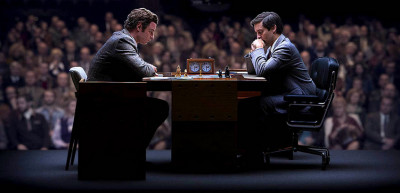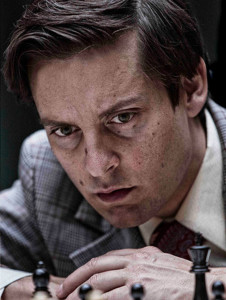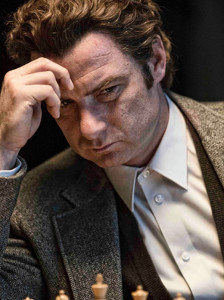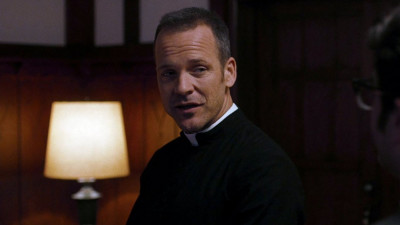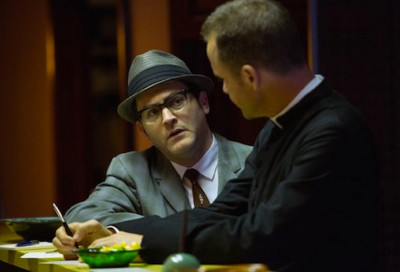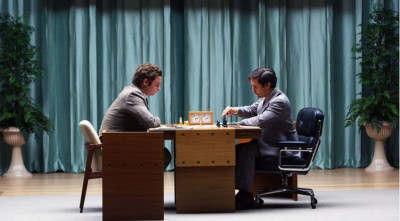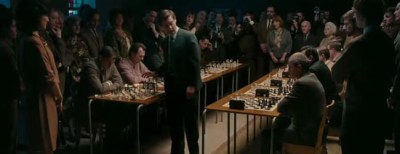It’s Check, and Mate, with “Pawn Sacrifice”. A mesmerizing character study of chess master and genius Bobby Fischer and corresponding socio-political historical commentary of the Cold War as played out across oceans and on a board with kings and queens and knights and pawns, screenwriter Steven Knight and director Ed Zwick not only recreate the events leading up to the unforgettable 1972 chess tournament between Bobby Fischer and Boris Spassky, but with meticulous craftsmanship and exacting detail, delve into the world events and life that shaped the boy from Brooklyn who would one day be king, Bobby Fischer.
Who among you didn’t want to learn the game of chess thanks to the sensation that was Bobby Fischer and the highly publicized 1972 battle for world champion of chess between Fischer and Soviet archrival Boris Spassky? For many of us, we quickly found ourselves glued to the television watching the matches on Wide World of Sports, no less. It was a tale as old as time. Brains over brawn. David versus Goliath. But in the grander scheme of things, this was the psychological battle for global supremacy between the United States and the USSR at its basest, and safest, level with Fischer and Spassky as the pawns for their respective governments.
We first meet Fischer as a young boy in Brooklyn. His mother, a well known and outspoken left-wing activist known for her dealings and advocacy with the Communist Party during the height of McCarthyism and the Red Scare, was under the watchful eye of the FBI and thus, so was young Bobby. Crammed into a bustling of house of his mother’s political comrades, Bobby found a release in the game of chess; focusing his attention on the game, blocking out the sounds and hushed whispers of the adults in the next room, getting his hands on Russian chess magazines, and setting his sights on being a world champion. For all of his mother’s advocacy for Communism, in addition to an ever growing paranoia within him, Bobby was pushed ever further to the opposite end of the spectrum, and because of that, he wanted to beat the best of the best in chess which, at the time, were the Russians.
Flash forward through the years and we see Fischer take junior title after junior title, moving into adulthood. But the more he won, the more erratic his behavior became; the more paranoid he became; and the more he hated the USSR and anyone associated with the Communist party.
But the time comes for that fateful 1972 match and we are there move for move, stunt for stunt, as we watch Fischer’s obsessive paranoia almost destroy him, but then in a moment of pure genius, from his own unpredictability, watch the earth-shattering Game 6 unfold and Spassky rise to his feet in applause for his worthy opponent.
Tobey Maguire is beyond Oscar-worthy and should see a Best Actor nomination this awards season. He is revelatory. Maguire channels not only Fischer’s genius, but his madness, infusing identifiable tics into the persona – the harsh yet often empty stare, the constant fiddling of a chess piece in his left hand, the flare for an almost zealot-like dramatic flare. Striking and startling, you can’t look away as Maguire draws you into Fischer’s mind, into his very essence, bordering on that brink of genius and madness, playing on our own uncomfortableness in Fischer’s skin, building the tension the way a master chessman makes an opponent wait for his next move.
But Liev Schreiber is ever bit Maguire’s equal, matching him move-for-move, delivering a flawless performance as Boris Spassky. Described as a straightforward, decent and very nice man” by many of the day, interesting is that Spassky was also not a member of the Communist party. He himself has oft been quoted as saying, “I live in a Communist state, but a I am not a Communist.” These glimpses of the man are key to Schreiber’s portrayal of Spassky. Fashionable dresser with sport coats and turtlenecks, and always behind sunglasses, Spassky was the polar opposite of his Soviet handlers. He was perhaps more Americanized than Fischer in his admiration of “The American Way”, something that Schreiber richly brings to life in both dress, hair style and mannerisms, but while retaining the well known stoicism and emotional control of the Soviets. The thoughtful pause, a look, the tilt of the head serving as a “voice.” Meticulous nuance. And then Schreiber’s Russian accent! As perfect here as in “The Sum of All Fears.” And shall we mention that Schreiber is a chess player in real life?
Two shining knights in the mix are Peter Sarsgaard and Michael Stuhlbarg. Sarsgaard is a delight, adding lightness and moments of levity as Fischer’s “second”, Father Bill Lombardy, while serving as an entre into chess for the layperson. Well structured dialogue by Steven Knight allows for Lombardy to give commentary on screen by way of explaining to others on Team Fischer as to what moves are being made and why, which also allows the audience to stay in the game. The sparkle of excitements and passion that Sarsgaard brings to Lombardy in those moments is emotionally resonant. Lombardy had played with Fischer in his youth and had actually beaten Spassky, but chose religion over chess as his vocation. And while he continued to play the game for fun, when it came time to reel in Fischer’s psychoses and paranoia, Lombardy was called into action. Key to Fischer ever making it to and through the World Championship in Reykjavik, Lombardy is pivotal to the story and Sarsgaard nails it.
And then there’s Michael Stuhlbarg. As intellectual property attorney and “manager”, Paul Marshall, Stuhlbarg is delicious. Honing in on Marshall’s rah-rah patriotism, where Stuhlbarg excels is developing the underlying mystery and motivations of Marshall, creating ambiguity and suspicion that neither in the film nor in real life, has ever been answered. Was Marshall working for the CIA or some other agency? Who was this man who could get Henry Kissinger on the phone without the necessity of a telephone operator? Stuhlbarg dives deep into the mysteries of Marshall, going above and beyond (as did Maguire and Schreiber) in researching the role, and even speaking with Marshall’s widow. The end result is a solid performance punch.
Written by Steven Knight (of “Locke” fame) and directed by Ed Zwick, the film follows that of a structured biopic, but gains its strengths not only through the Maguire’s performance as well as the others, but through its cinematography and editing. Written knowing that Maguire would be portraying Fischer, Knight dug deep, incorporating the psychology of Fischer and the psychology of chess into the script. Using the seminal book on Fischer by Joseph Ponterotto, PhD as the foundation for the story, the emotional insight is both striking and poignant with each principal player three-dimensional and deeply textured. The metaphor of chess and the global politics of the day is a constant subtextual presence which gives rise to discussion and thought long after the curtain falls.
The film’s tonal bandwidth rises and falls on the cinematography and its juxtaposition with Maguire’s performance. The archival footage steeps us in the period, but then as cinematographer Bradford Young and Zwick move us in and out of Fischer’s mind and specific games and events utilizing a segue from black & white to muted color and back again, the result is beyond winning. The visual design of lensing and lighting mirrors a chess game. Little visual and psychological touches harvested by Zwick from looking at footage of the actual match archival footage add moments of head shaking, nail biting and curiosity, reminding us that these are merely men, as fallible and as imperfect as each of us.
For all the trivia buffs out there, as you watch “Pawn Sacrifice” and the recreation of that World Championship in Iceland, take heart in knowing that the very table on which Maguire and Schreiber are playing is THE table used by Fischer and Spassky. Discovered in a storage room in the back of the building where the match was played, Zwick had it flown to the set in Toronto for the film. Similarly, the chairs in which they sit, while not the original chairs (which were also still in the building in Iceland), are exact reproductions. Kudos to production designer Isabelle Guay for her overall design and look of the film for spanning the decades and cultures, seamlessly steeping us in time and place.
And although you’ll be mesmerized by Maguire, the story and by the film’s visuals, do not overlook the film’s soundtrack which rocks and rolls with 70’s classics from CCR, Jefferson Airplane and The Doobie Brothers, among others.
Like the game of chess itself, with 40 billion combinations of moves to be made, from the Queen’s Gambit to Tartakower’s Defense, from its first move to its last, “Pawn Sacrifice” never misses.
Directed by Ed Zwick
Written by Steven Knight
Cast: Tobey Maguire, Liev Schreiber, Peter Sarsgaard, Michael Stuhlbarg

